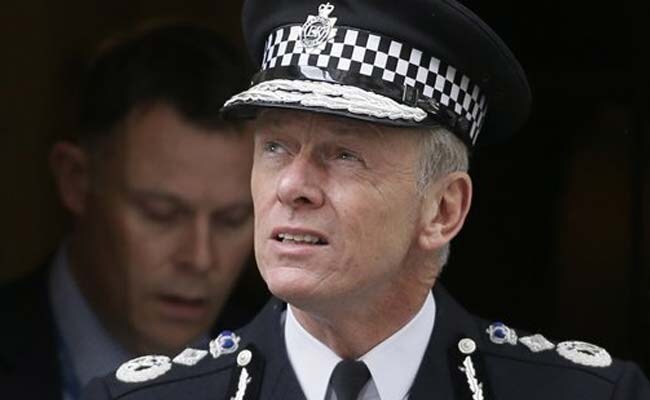
File Photo: Scotland Yard Commissioner Bernard Hogan-Howe. (Associated Press)
London:
British police have foiled four or five suspected terror plots this year, the country's most senior police officer said on Sunday ahead of a week-long campaign to enlist the public's help in countering the threat.
"We've said on average over the last few years it's been about one (plot) a year, but this year alone we think four or five," Scotland Yard Commissioner Bernard Hogan-Howe told BBC.
He added: "Certainly we've seen a change to the momentum... we've seen a change to the frequency and the seriousness of the types of plots that we're looking at."
As part of new measures to counter extremism, Home Secretary Theresa May is to announce on Monday that insurance companies will be banned from paying out terrorist ransoms, according to released remarks.
Counter-terrorism investigations have led to 271 arrests this year, Metropolitan Police Assistant Commissioner Mark Rowley on Monday.
Most recently, three people were charged in London last week over an alleged plot which media reports said included a plan to behead somebody in Britain.
Rowley warned that the threat posed by extremists has "evolved" and that they are now home grown, as he launched a new awareness campaign to encourage communities to help the "eyes and ears" of law enforcement.
Hogan-Howe said the threat from so-called "lone wolf" attacks by individuals or small groups was causing "growing concern", and warned their ability to act quickly left little time for the security services to intervene.
But he said the public could help by being more vigilant, particularly in crowded places and transport hubs where attacks are more likely to happen.
For a week starting on Monday, police will brief over 6,000 people at 80 venues including schools and shopping centres across Britain to let ordinary people and businesses know how they can help by identifying and reporting suspicious behaviour.
The campaign will also urge people to question charities about where their money is going, amid concerns that some is being used to channel funds to militants.
"If the public, the businesses and police work together with the security services then that's an incredibly powerful team," Hogan-Howe said.
The national terror threat was raised in August to "severe", meaning an attack is highly likely, but the police chief said the message was to "keep calm but be aware".
He repeated fears that Britons who have gone to fight with jihadist groups in Iraq and Syria might return to use their new training and experience to launch an attack in Britain.
But he did not comment on a claim by an opposition Labour lawmaker that as many as 2,000 Britons are fighting overseas -- four times the official estimate of 500.
Khalid Mahmood, an MP in the city of Birmingham, told the Sunday Telegraph newspaper that in his area- which has a large Muslim community- there was a "huge problem" of people going to fight with the Islamic State (IS) group.
"We've said on average over the last few years it's been about one (plot) a year, but this year alone we think four or five," Scotland Yard Commissioner Bernard Hogan-Howe told BBC.
He added: "Certainly we've seen a change to the momentum... we've seen a change to the frequency and the seriousness of the types of plots that we're looking at."
As part of new measures to counter extremism, Home Secretary Theresa May is to announce on Monday that insurance companies will be banned from paying out terrorist ransoms, according to released remarks.
Counter-terrorism investigations have led to 271 arrests this year, Metropolitan Police Assistant Commissioner Mark Rowley on Monday.
Most recently, three people were charged in London last week over an alleged plot which media reports said included a plan to behead somebody in Britain.
Rowley warned that the threat posed by extremists has "evolved" and that they are now home grown, as he launched a new awareness campaign to encourage communities to help the "eyes and ears" of law enforcement.
Hogan-Howe said the threat from so-called "lone wolf" attacks by individuals or small groups was causing "growing concern", and warned their ability to act quickly left little time for the security services to intervene.
But he said the public could help by being more vigilant, particularly in crowded places and transport hubs where attacks are more likely to happen.
For a week starting on Monday, police will brief over 6,000 people at 80 venues including schools and shopping centres across Britain to let ordinary people and businesses know how they can help by identifying and reporting suspicious behaviour.
The campaign will also urge people to question charities about where their money is going, amid concerns that some is being used to channel funds to militants.
"If the public, the businesses and police work together with the security services then that's an incredibly powerful team," Hogan-Howe said.
The national terror threat was raised in August to "severe", meaning an attack is highly likely, but the police chief said the message was to "keep calm but be aware".
He repeated fears that Britons who have gone to fight with jihadist groups in Iraq and Syria might return to use their new training and experience to launch an attack in Britain.
But he did not comment on a claim by an opposition Labour lawmaker that as many as 2,000 Britons are fighting overseas -- four times the official estimate of 500.
Khalid Mahmood, an MP in the city of Birmingham, told the Sunday Telegraph newspaper that in his area- which has a large Muslim community- there was a "huge problem" of people going to fight with the Islamic State (IS) group.
Track Latest News Live on NDTV.com and get news updates from India and around the world

